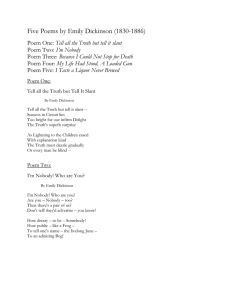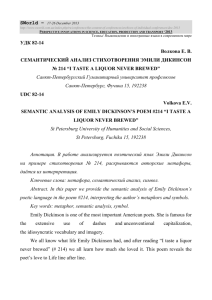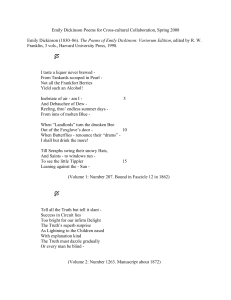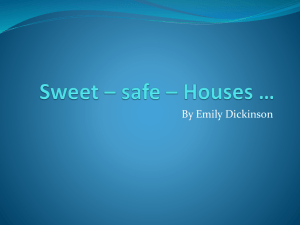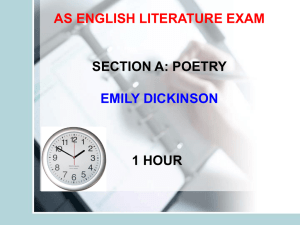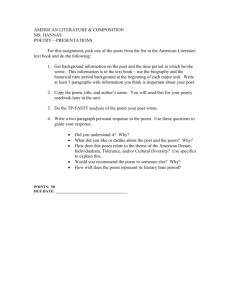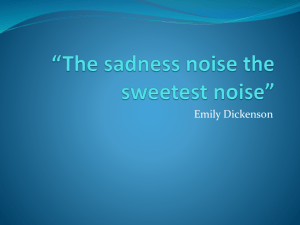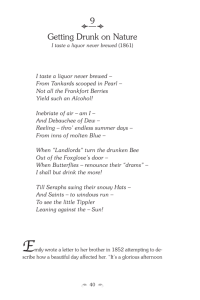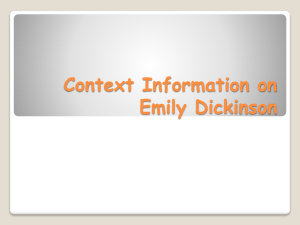File - Elizabeth Lujan
advertisement
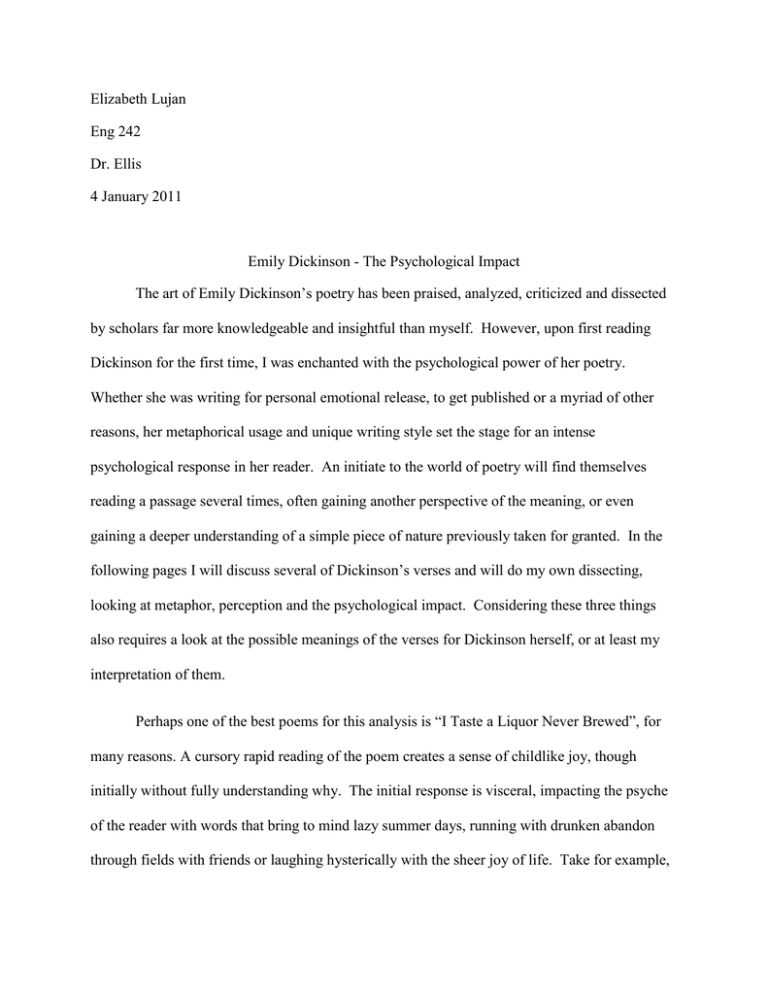
Elizabeth Lujan Eng 242 Dr. Ellis 4 January 2011 Emily Dickinson - The Psychological Impact The art of Emily Dickinson’s poetry has been praised, analyzed, criticized and dissected by scholars far more knowledgeable and insightful than myself. However, upon first reading Dickinson for the first time, I was enchanted with the psychological power of her poetry. Whether she was writing for personal emotional release, to get published or a myriad of other reasons, her metaphorical usage and unique writing style set the stage for an intense psychological response in her reader. An initiate to the world of poetry will find themselves reading a passage several times, often gaining another perspective of the meaning, or even gaining a deeper understanding of a simple piece of nature previously taken for granted. In the following pages I will discuss several of Dickinson’s verses and will do my own dissecting, looking at metaphor, perception and the psychological impact. Considering these three things also requires a look at the possible meanings of the verses for Dickinson herself, or at least my interpretation of them. Perhaps one of the best poems for this analysis is “I Taste a Liquor Never Brewed”, for many reasons. A cursory rapid reading of the poem creates a sense of childlike joy, though initially without fully understanding why. The initial response is visceral, impacting the psyche of the reader with words that bring to mind lazy summer days, running with drunken abandon through fields with friends or laughing hysterically with the sheer joy of life. Take for example, Lujan 2 the first line, also the title, “I taste a liquor never brewed – “. The combination of the words liquor and never brewed evoke feelings of abandonment, and fantasy such as one feels when one is a child. As humans when we taste something the majority of our senses and body are involved in the act, therefore the use of the word taste creates for the reader a total sensory perception of the abandonment and fantasy she wants you to feel. In her article “’I Taste a Liquor Never Brewed’: A Variant Reading” Cecil Eby tackles the word “I” in the opening line, claiming that Dickinson is referring to a hummingbird on a drunken spree rather than the author herself as the participant in the poem. Eby goes on to say that this creates an impersonal tone in the poem (517). Similarly, Eby interprets “liquor never brewed” as the nectar the hummingbird is drunk on (517). While Eby is interpreting Dickinson’s poetry in her own way as all readers must do, when viewed from a psychological impact the impression remains the same. The hummingbird evokes feelings of abandonment and fantasy, as does the nectar, setting the tone for the childlike joy of the rest of the poem. “From Tankards scooped in Pearl/Not all the Frankfort Berries/Yield such an Alcohol!” Tankards, while being an adult word, in conjunction with scooped pearls draws the reader back to childhood and images of summer parties with sunlight sparkling off of dewy glasses. Again, this draws the psyche to times of effortless fun and timeless joy. The second and third stanzas are the sudden cold rainstorm in the middle of summer. Dickinson splashes the poem with the adult joys that are tempered with worry and stress, creating a liminal space between absolute abandon and the responsibilities of adulthood. The prolific use of adult words associated with drinking and drunkenness tie the disparate pieces together, allowing the reader to feel the rightness of the abandonment. For instance, inebriate by itself is a word with negative connotations, but when placed with “of air”, the threshold is crossed and abandon becomes not only fun, but allowable. Douglas Anderson says, in his article Lujan 3 “Presence and Place in Emily Dickinson’s Poetry”, that “Dickinson's understanding and use of the idea of ‘presence’ as a synecdoche for transcendent experience can be unusually subtle.” (Anderson 213). As a reference to “I Taste a Liquor Never Brewed”, this is especially true. While Anderson is referring to several poems discussed in his article, the use of presence and place is apropos for this poem as well. Anderson argues that the use of negatives in one of her poems, like the words “Inebriate” and “Debauchee”, do not carry any sense of puzzlement or the following frustration, creating a sense of “peace without knowledge” (214) that is essential in the poem we are discussing. In the end of the stanza the “’Landlords’ turn the drunken Bee/out of the Foxglove’s door”, and yet “When Butterflies – renounce their ‘drams’/I shall but drink the more!” The presence of the ‘landlords’ could be a negative, but the reader will keep drinking of life, though all the others, “Butterflies”, have given up. In the end the adults, written in as “Seraphs” and “Saints” run to watch the fun. The reader feels almost sorry for these poor adults, because all they get to do is watch the little “Tippler” have all the fun. This last segment ties the rest of the poem together, creating the circumference of the poem. In the abstract, it can be said to represent the circle of life as this poem brings out the child in the reader, subtly reminds that the ties of the adult still bind, then ties it closed with the jealousy an adult sometimes feels watching a child at place, a bird in flight and yearns for that absolute abandonment and aches for that fantasy just one more time. Emily Dickinson demonstrates in this poem, “I Taste a Liquor Never Brewed”, a unique knack for snagging the psyche of her reader. Each reader will feel the poem differently because the words she uses will mean something different to each individual, as discussed in the beginning. However, I can say without hesitation, that the psychological impact of her words will remain with me forever. Lujan 4 Works Cited Anderson, Douglas. “Presence and Place in Emily Dickinson's Poetry.” The New England Quarterly 57.2 1984: 205-224. JSTOR. The New England Quarterly, Inc. Web. 3 Jan. 2011. Eby, Cecil D. “’I Taste a Liquor Never Brewed’: A Variant Reading.” American Literature 36.4 1965:,516-518 JSTOR. Duke University Press. Web. 4 Jan. 2011. Dickinson, Emily. “I Taste a Liquor Never Brewed.” The Norton Anthology: American Literature. Ed. Nina Baym. New York. Norton & Company. 2008. 1203. Print.
